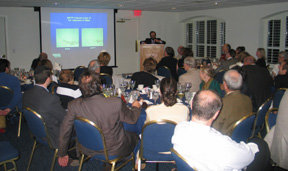 |
Three CNND researchers provided progress reports to the CNND Community Awareness Council of Nebraska and other interested parties on how the center is looking for new ways to fight brain inflammation that affects neurodegenerative processes in mouse models of human Parkinson’s and Alzheimer’s disease.
Sharing scientific knowledge
“This was one of those times when you have the unique opportunity to share the scientific process made in medical research with the community,” said Howard Gendelman, M.D., professor of pathology and microbiology and director of the CNND. “Our research utilizes mouse models of human disease which closely reflect human neurodegenerative processes.
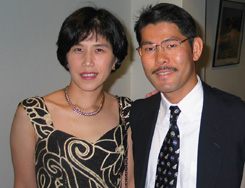 |
Tsuneya Ikezu, M.D., Ph.D., and his wife, Seiko. |
Collaboraring on vaccines for Parkinson’s, ALS
Dr. Gendelman said CNND scientists are collaborating with researchers from Columbia University in New York on the development of vaccines for Parkinson’s and amyotrophic lateral sclerosis (ALS). Clinical trials in humans with ALS disease are expected to begin in New York this fall.
Dr. Gendelman credited Eric Benner, an M.D., Ph.D. student at the CNND, with playing a lead role in developing a blueprint for a Parkinson’s vaccine. Also instrumental in the center’s initial vaccine success were R. Lee Mosley, Ph.D., Michael Boska, Ph.D., and Travis Lewis, who developed the scientific approaches needed for measuring nerve cell protection in mice with an experimental form of Parkinson’s disease.
The CNND’s research premise
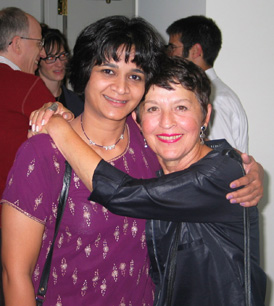 |
Anuja Ghorpade, Ph.D., and Eunie Denenberg, a member of the CNND Community Awareness Council. |
The destruction of neurons can result in serious neurodegenerative disorders such as Parkinson’s and Alzheimer’s diseases.
“What we have done is take an evil process (inflammation and neurodegeneration) and turned it on its heels,” Dr. Gendelman said. “We’ve taken something bad and made it good. We’ve found that inflammatory responses can have a dual role in disease.”
Additional research presentations
In addition to Dr. Gendelman, the CNND Community Awareness Council heard presentations from two other CNND scientists – Tsuneya Ikezu, M.D., Ph.D., and Anuja Ghorpade, Ph.D. – as well as a visiting scientist from the Arctic Biology Laboratory at the University of Alaska Fairbanks, Kelly Drew, Ph.D.
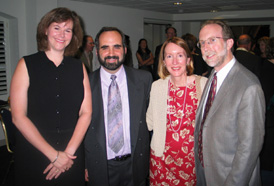 |
From left: Howard Gendelman, M.D., with CNND supporters Sue Baggerly-Seline, left, and Kathleen Bradley and husband Sandy Goodman. |
Both Drs. Ghorpade and Ikezu are past recipients of the Vada Kinman Oldfield Alzheimer’s Research Fund through the University of Nebraska Foundation for their research work in Alzheimer’s disease.
The growing need for Alzheimer’s research
Dr. Ikezu detailed the importance of Alzheimer’s research and cited figures that brought home the expected magnitude of the disease into the next decade and beyond. He said Medicare spending on Alzheimer’s disease totaled $31.9 billion in 2000 and is expected to climb to $49.3 billion by 2010. This would represent about 14.4 percent of total Medicare spending.
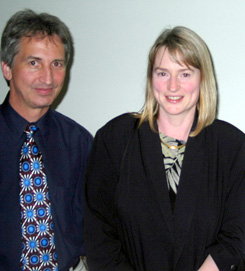 |
Mark Thomas, Ph.D., left, with Kelly Drew, Ph.D. |
Researching Arctic ground squirrels
Dr. Drew, who is formerly from Lincoln, Neb., is now collaborating with CNND scientists on research on Arctic ground squirrels in Alaska. The Arctic ground squirrel enters a state of hibernation during the winter months and somehow comes out of hibernation each spring without any injury to the brain. During this hibernation period, the squirrel’s body temperature falls below freezing, she said.
Using a proteomics technique developed by the CNND, the scientists hope to discover what signals occur in the squirrel’s brain during hibernation to allow the brain to avoid injury. Proteomics involves the discovery of new protein signatures that may be used for both diagnosis and therapy of disease. It is hoped that the findings from this study will someday be applicable to humans.
Council members offer praise
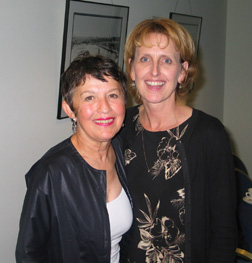 |
Eunie Denenberg, a member of the CNND Community Awareness Council, with the CNND’s Robin Taylor. |
Denenberg said, “We’re proud that we have such remarkable scientists and facilities here in Omaha. It enriches our whole society.”
Lewis added, “Thank you all very much for what you’ve done for mankind.”
Fund established
In an effort to keep the CNND financially strong into the distant future, the CNND Community Awareness Council has established a fund with the University of Nebraska Foundation. For more information on this fund, call 595-2302.